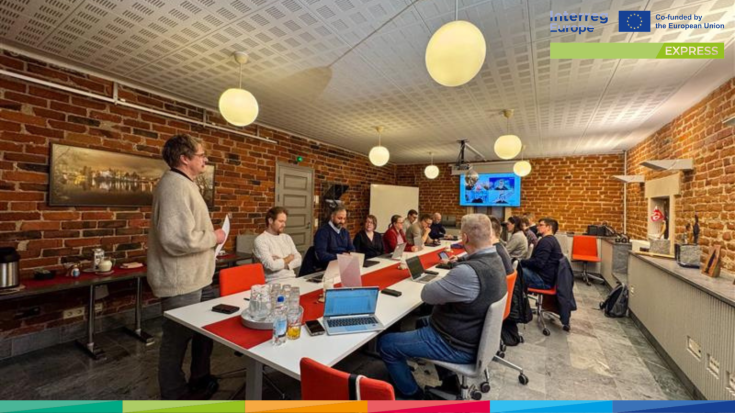Finland | North Karelia Models Its Energy Future

The EXPRESS project’s Energy Scenario Workshop brought together representatives from regional research institutes, educational organizations, municipalities, business development companies, and the energy sector to discuss the future of energy in North Karelia on January 24, 2025. The workshop aimed to assess the economic, social, and climate impacts of three different 2040 energy scenarios and explore concrete measures to enhance regional vitality and promote the green transition.
"The results of the ongoing energy scenario work will contribute to the preparation of the next regional program, POKAT2029, and will also be directly utilized in the implementation of North Karelia’s Climate and Energy Program," says Regional Planning Manager Pasi Pitkänen. The upcoming regional strategic programme for 2026–2029 will particularly emphasize global and local geopolitical changes as well as the adoption of artificial intelligence.
Scenarios, Their Impacts, and Opportunities
1. Eastern Finland as Part of the Energy Solution
The green transition enables significant investments in renewable energy, particularly wind and solar power, as well as the hydrogen economy. Economic and social development would be strong, with substantial impacts on employment and skill requirements in the region.
2. Drifting Log – A Slowly Declining Border Region
Low transmission capacity in the main power grid and the impact on the Finnish Defense Forces’ radar systems continue to prevent large-scale industrial wind and solar power investments. The green transition progresses more slowly in North Karelia than in the rest of Finland, though some small-scale advancements are still possible.
3. A Depleting Eastern Buffer Zone
Prolonged geopolitical tensions slow down the progress of the green transition internationally. These challenges are particularly pronounced in Eastern Finland and areas near the Russian border. Investments stall, and regional vitality and economic activity decline sharply.
The workshop highlighted the enormous potential of the positive scenario: investments in renewable energy and the hydrogen economy could reach the billion-euro scale, creating significant job opportunities and attracting new talent to the region. North Karelia could achieve energy self-sufficiency, with renewable energy production exceeding total energy consumption. Discussions also covered the development of energy infrastructure, such as increasing distribution network capacity and land-use planning for renewable energy production.
In contrast, the negative scenarios emphasized risks such as as declining population and reduced economic activity. To counter these risks, active measures are needed to enhance the region’s attractiveness, develop local expertise, and strengthen infrastructure.
Modeling Reveals Regional Economic Impacts and Future Education Needs
As part of a study conducted by Sweco Finland Oy, the impacts of the scenarios were modeled over a 30-year period. The most significant effects on employment and regional vitality were identified in hydrogen production and its downstream industries. Investments in renewable energy and the hydrogen economy would not only create new jobs but also generate substantial regional revenue through land lease payments and municipal tax income from property and corporate taxation.
Fully leveraging the green energy transition to create new jobs requires adapting education to meet the evolving skill needs of businesses. The launching of the University of Eastern Finland’s new data engineering programmes in fall 2026 will support these investments by producing experts in electrification and digitalization.
Workshop participants shared a strong commitment to advancing the green transition in North Karelia. Key barriers to major investments—such as insufficient main grid capacity, radar restrictions, and logistical limitations—must be addressed. Additionally, efforts should focus on improving marketing and regional visibility, along with proactive initiatives to attract investments.
North Karelia has been a pioneer in renewable energy for decades, and the workshop’s message was clear: with determined and forward-thinking action, the region can continue to lead the way in the green transition.
The report of the North Karelia Energy Scenarios 2040 study will be published on February 24, 2025.
